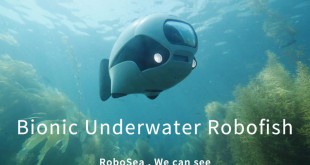Introduction As humanity sets its sights on ambitious missions to the Moon, Mars, and beyond, the limitations of conventional propulsion systems become increasingly evident. The demands of deep space exploration require propulsion technologies that can deliver high acceleration, specific impulse, and fuel efficiency. The Limits of Conventional Propulsion Traditional chemical …
Read More »Innovation Beneath the Waves: Biomimetic Propulsion Systems for Ships and Unmanned Underwater Vehicle
The exploration of the underwater world has always fascinated humankind, prompting scientists and engineers to develop advanced technologies for underwater vehicles. Unmanned underwater vehicles (UUVs), also known as underwater drones, are submersible vehicles that can navigate their way through various water systems with or without human intervention. Typically, UUVs fall …
Read More »SOSA Standard: Revolutionizing Defense Electronics and Electronic Warfare Design
Introduction: The battlefield of the future is digital, interconnected, and increasingly complex. To maintain dominance in this rapidly evolving landscape, the U.S. military needs cutting-edge technology that is modular, adaptable, and capable of operating seamlessly in a congested electromagnetic spectrum. Enter the SOSA (Sensor Open Systems Architecture) Standard, a revolutionary …
Read More »The Double-Edged Sword: AI in Terrorism and Counterterrorism
Introduction In an era dominated by technological advancements, the influence of artificial intelligence (AI) is extending into various aspects of our lives. While AI has shown immense potential in areas like healthcare, education, and business, it also raises concerns about its potential misuse. One such area of concern is the …
Read More »From Space to Earth: Spinoff Technologies that Transformed Our World
Introduction: The vast expanse of space has not only fueled our curiosity about the cosmos but has also catalyzed the development of revolutionary technologies that have transformed life on Earth. While the space race of the mid-20th century primarily focused on lunar landings and exploring other planets, the technologies developed …
Read More »Revolutionizing Aerospace and Defense: The Power of High-Performance Connectors
The battlefield is a demanding environment. Aerospace and defense applications require robust and reliable communication systems that can withstand harsh conditions, intense vibration, and extreme temperatures. In the dynamic world of aerospace and defense, where reliability is not just a preference but a necessity, the significance of robust and dependable …
Read More »Navigating the Future: Trends and Insights in Network Management
Introduction: In the fast-paced digital landscape, where connectivity is the heartbeat of modern enterprises, effective network management plays a pivotal role in ensuring seamless operations. The ever-evolving technological landscape, coupled with the increasing demand for robust connectivity, has given rise to several trends shaping the network management market. In this …
Read More »Revolutionizing Space Communications: Exploring the Potential of Spaceborne Optical Switching Technology
Introduction: In the vast expanse of space, communication plays a pivotal role in enabling seamless interactions between Earth and satellites or spacecraft. Traditional radio frequency (RF) communication has long been the go-to method for space-based communication. However, a new era is dawning with the emergence of spaceborne optical switching technology. …
Read More »Revolutionizing Disaster Response: The Role of Low-Bandwidth Remote Situational Awareness Communications Mesh Networks
Introduction: Disasters, whether natural or man-made, demand swift and effective response strategies. One of the biggest challenges in disaster response is establishing reliable communication networks, especially in remote or bandwidth-constrained areas. In recent years, the concept of low-bandwidth remote situational awareness communications mesh networks, powered by small radios, has emerged …
Read More »Advancing National Security: The Technological Frontier of Energetics Innovation
Introduction: In the ever-evolving landscape of national security, maintaining technological superiority is imperative. Recognizing this challenge, the United States has embarked on a pivotal strategic initiative: the National Energetics Plan. This visionary plan not only focuses on developing next-generation capabilities but also aims to fortify the resilience and adaptability of …
Read More » International Defense Security & Technology Your trusted Source for News, Research and Analysis
International Defense Security & Technology Your trusted Source for News, Research and Analysis

